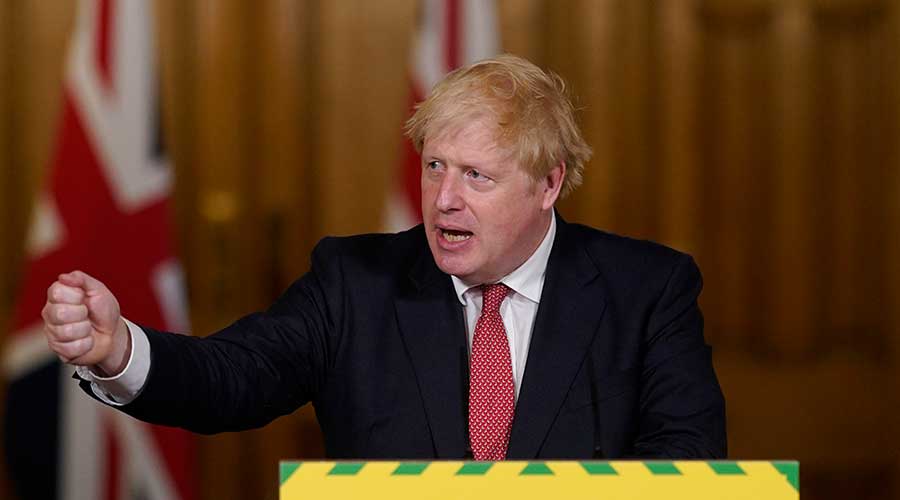Boris Johnson came to the Commons just after noon on Tuesday after holding a 6.30am (local time) emergency cabinet meeting to inform MPs that the UK was imposing sanctions against five Russian banks and three wealthy Russians considered close to the Kremlin.
This was the British Prime Minister’s response to President Vladimir Putin’s decision to recognise the independence of Luhansk and Donetsk in eastern independence.
“I’m afraid all the evidence is that President Putin is indeed bent on a full scale invasion of the Ukraine, the overrunning, the subjugation of an independent, sovereign European country and I think, let’s be absolutely clear, that will be absolutely catastrophic,” said Boris.
He announced: “Today, the UK is sanctioning the following five Russian banks: Rossiya, IS Bank, General Bank, promsvyazbank and the Black Sea Bank.
“And we are sanctioning three very high net worth individuals: Gennady Timchenko, Boris Rotenberg, and Igor Rotenberg.”
Boris added: “Any assets they hold in the UK will be frozen, the individuals concerned will be banned from travelling here and we will prohibit all UK individuals and entities from having any dealings with them.
“This is I should stress just the first barrage of UK economic sanctions against Russia because we expect I’m afraid that there is more Russian irrational behaviour to come.”
The British response appears measured and proportionate, with even more punitive sanctions being held back in case Putin launches a full scale invasion of Ukraine.
The British seem prepared for a prolonged crisis.
Boris acknowledged: “We cannot tell what will happen in the days ahead but we should steel ourselves for a protracted crisis. The UK will meet this challenge side by side with our allies.”
Several military figures warned that the conflict over Ukraine could escalate to all-out war in Europe. The word “nuclear” was mentioned.
For example, General Sir Richard Sherriff, Britain’s former top Nato commander, called the Ukraine situation “the most dangerous moment in Europe probably at least since 1962 and the Cuban missile crisis”.
The prime minister “saluted” German Chancellor Olaf Scholz for his “brave” decision to pull the plug on the Nord Stream 2 gas pipeline from Russia. And he made clear he backed stopping the Champions League football final happening in St Petersburg this year.
Boris’s remarks suggest the door to a diplomatic solution is not entirely closed. Foreign Secretary Liz Truss summoned Russia’s ambassador to the UK, Andrei Kelin, to explain Putin’s actions.
Efforts will continue to “seek a diplomatic solution until the last possible moment”, the prime minister said.
Aware that sanctions will also hurt Britain, he renewed his call for European countries to wean themselves off Russian energy. “In the UK we have been able to reduce our dependency on Russian gas very substantially. Only 3 per cent of our gas supplies now come from Russia.”
Boris also hinted at supplying more weaponry to Kiev’s forces, confirming that the UK had already given “lethal but defensive” assistance and “we’re looking at what we can do”.
“Our thoughts should turn to our gallant Ukrainian friends who threaten no one, who ask for nothing except to live in peace and freedom,” said Boris, who ended his statement by pledging: “Whatever happens Britain will not waiver in our resolve.”
Giving his full backing to Boris, the Labour leader Keir Starmer said it had been “a dark day for Europe” and the UK “must stand firm” in its support for Ukraine and remain united with Nato allies to “show Putin that we will not be divided”.
The former Conservative prime minster Theresa May raised concerns that the situation in Ukraine reflected a wider worldwide trend of authoritarian states trying to impose their way of thinking on others. “The battle we now face is the defence of democracy itself,” she declared.
Boris agreed: “That is what is at stake.”
The Daily Telegraph reported: “Russian oligarchs and Kremlin-linked organisations have begun intense lobbying of the Foreign Office to avoid sanctions if Moscow invades Ukraine. It is understood the Foreign Office has been contacted by panicked Russian oligarchs and firms collectively worth hundreds of millions of pounds.”
An assessment of Britain’s foreign policy was made by Nick Eardley, a BBC political correspondent, who said: “The view in No 10 is that sanctions should be used wisely and at the right time. That means what we’ve seen today is the first of the measures being prepared in Whitehall. There could be a lot more to come.
“The overall UK assessment of the current situation in Ukraine is a bleak one. The government believes an invasion has started – and there could be a lot worse to come. It is clear from the assessment in London that there is a feeling this could be a long conflict, which could get worse over time.”

